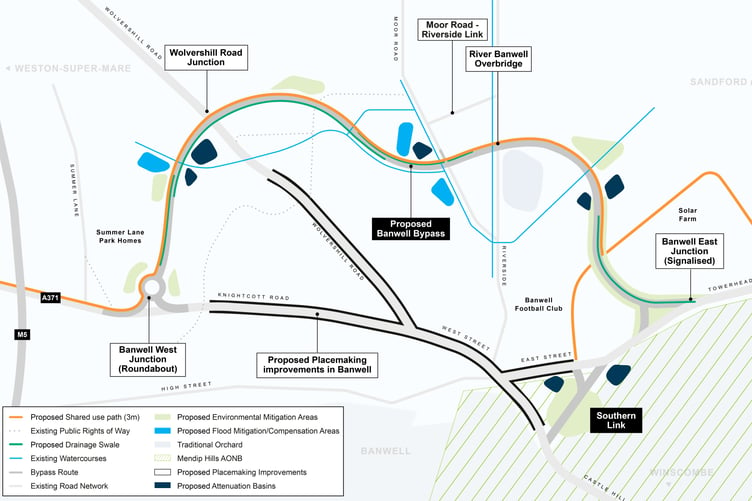Construction of a bypass around a congested Banwell could start in six months after the scheme received final approval from the Council.
North Somerset Council unanimously approved the £56.5m contract for the construction of the bypass at a meeting on November 14, the final step of Council approval needed for the long awaited scheme. But a favourable decision from the secretary of state on the compulsory purchase orders will still be needed before work can start.
Council leader Mike Bell said that they expected to get the decision by Christmas and hoped work could start in May 2024. He said a “pain/gain” contract would encourage contractors to deliver the scheme on time and within budget, with a hope to have it completed by May 2026 — which would be almost exactly 100 years since the scheme was first proposed.
Previous Council leader Steve Bridger said: “Banwell bypass has been proposed since 1927 so lets get it done and give residents of Banwell their village back.”
Mr Bell said: “Its a significant milestone in delivering a bypass that has long been hoped for but never achieved. I was in Banwell recently for some of our budget engagement work and one resident told me in the mobile library that he would be ‘flabbergasted’ if a bypass was ever built.
“Well, I’m pleased that if we do support this report, he can prepare for his flabber to be gasted.”
Councillors voted unanimously to approve the bypass construction.
The contract to build the bypass was awarded to Alun Griffiths (Contractors) Ltd. The contract is forecast to cost £56.5m, out of the total £89.2m funding for the scheme which also covers other costs such as consultants, utilities, and contingency money.
Homes England has provided £77.3m of this money, with North Somerset Council contributing £11.9m.
Banwell faces a serious congestion issue as two A-roads meet in the village where roads narrow and at one point are only wide enough for cars to travel in one direction.
Planning permission for the scheme was granted in March. A public inquiry was held over the compulsory purchase orders needed to secure the land for the scheme in July.
John Wimperis, Local Democracy Reporter





Comments
This article has no comments yet. Be the first to leave a comment.